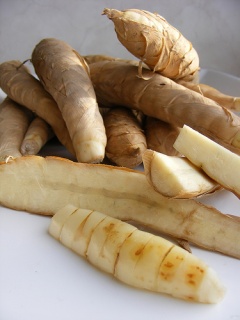Arrowroot
| Infobox on Arrowroot | |
|---|---|
| Example of Arrowroot |  |
| Facts | |
| Origin | Sri Lanka, West Indies, S. America |
| Stowage factor (in m3/t) | - |
| Humidity / moisture | - |
| Ventilation | - |
| Risk factors | - |
Arrowroot
Description
Arrowroot is a yellowish white rootstock covered with loose scales. It originated from a perennial plant which has white flowers and fruits in the size and form of currants.
It is a starchy food extracted from the tuberous roots of various plants. Shipped in considerable quantities from Sri Lanka, West Indies, S. America.
Application
Arrowroot (obedience plant, Maranta arundinacea) is a large perennial herb cultivated for starch obtained from the roots. When cooked, arrowroot starch turns to a "perfect jelly" which can be used in the preparation of sauces, pudding, jellies, breads, desserts or as a thickener. Since arrowroot flour contains no gluten, it is a useful replacement for wheat flour although it does not contain the same nutrients. Arrowroot was also once used in papermaking.
Use of the arrowroot plant has been traced back to the 1600s. The Arawak people of the Carribean Islands called it "aru-aru" (meal of meals). Arrowroot was administered medicinally as a cure for poisoned arrows, hence its name.
Arrowroot starch is prepared by first washing the rhizome (root) and removing the scales. The root is grated or beaten to a pulp in a mortar. The liquid pulp is passed through a sieve. The liquid is then dried to a powder, packaged and sold.
Shipment / Storage / Risk factors
Arrowroot is a delicate cargo susceptible to moisture absorption and as such should not be stowed in containers or in general stowed with cargoes which sweat or throw off taint.
Arrowroot is a very delicate cargo which absorbs moisture very readily. It must be stowed in a dry compartment containing no cargo likely to throw off moisture or odour.











